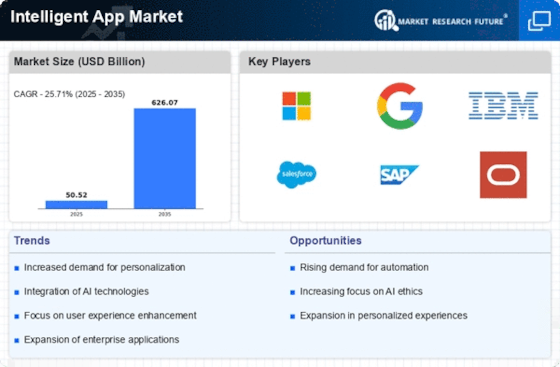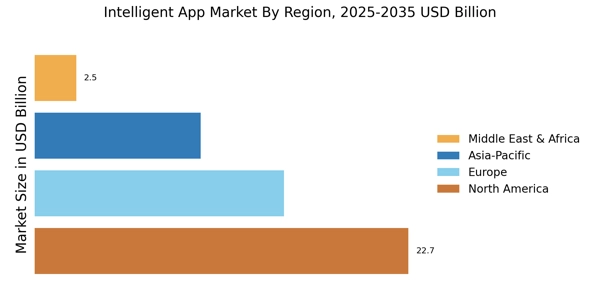Rising Demand for Automation
The Intelligent App Market experiences a notable surge in demand for automation solutions. Businesses are increasingly seeking to streamline operations and enhance efficiency through intelligent applications. According to recent data, the automation software market is projected to reach a value of approximately 100 billion dollars by 2025. This trend indicates a growing recognition of the potential benefits that intelligent applications can offer, such as reduced operational costs and improved productivity. As organizations strive to remain competitive, the integration of intelligent apps that facilitate automation becomes essential. This driver not only reflects the current market dynamics but also suggests a shift towards more sophisticated technological solutions that can adapt to evolving business needs.
Advancements in Machine Learning
The Intelligent App Market is significantly influenced by advancements in machine learning technologies. These innovations enable applications to learn from user interactions and improve over time, thereby enhancing user experience. The machine learning market is expected to grow at a compound annual growth rate of over 40%, indicating a robust interest in these technologies. As intelligent applications leverage machine learning algorithms, they can provide personalized recommendations and predictive analytics, which are increasingly sought after by businesses. This driver highlights the importance of continuous technological evolution in shaping the capabilities of intelligent apps, ultimately leading to more effective solutions for end-users.
Growing Emphasis on User Experience
The Intelligent App Market is witnessing a growing emphasis on user experience as a critical factor for success. Companies are increasingly aware that user-friendly interfaces and seamless interactions can significantly influence customer retention and satisfaction. Research indicates that applications with superior user experience can lead to a 200% increase in user engagement. This trend compels developers to prioritize design and functionality in intelligent applications. As businesses strive to differentiate themselves in a competitive market, the focus on enhancing user experience becomes a vital driver for the intelligent app sector, ultimately shaping the future of application development.
Increased Mobile Device Penetration
The Intelligent App Market is positively impacted by the rising penetration of mobile devices across various demographics. With an estimated 5 billion mobile users worldwide, the demand for intelligent applications that cater to mobile platforms is on the rise. This trend suggests that businesses are recognizing the necessity of developing applications that are not only functional but also user-friendly on mobile devices. As mobile technology continues to evolve, intelligent apps that utilize features such as location services and push notifications are becoming increasingly popular. This driver underscores the importance of mobile accessibility in the intelligent app landscape, as it directly correlates with user engagement and satisfaction.
Expansion of Cloud Computing Services
The Intelligent App Market is significantly shaped by the expansion of cloud computing services. As organizations migrate to cloud-based solutions, the demand for intelligent applications that can operate efficiently in these environments is increasing. The cloud computing market is projected to exceed 500 billion dollars by 2025, indicating a robust growth trajectory. This expansion allows for greater scalability and flexibility in deploying intelligent applications, enabling businesses to respond swiftly to market changes. Furthermore, the integration of cloud services with intelligent apps facilitates real-time data processing and analytics, enhancing decision-making capabilities. This driver highlights the symbiotic relationship between cloud computing and the intelligent app market, suggesting a future where cloud-based intelligent solutions become the norm.

















